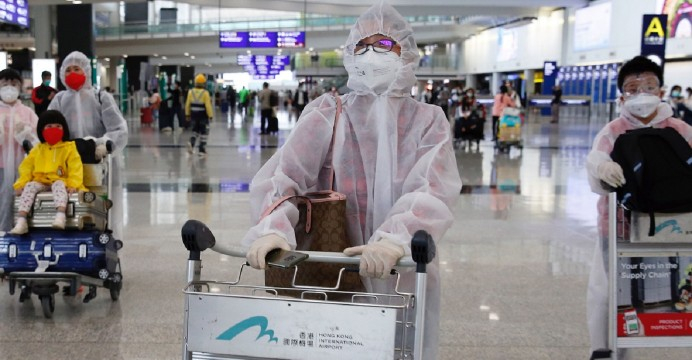China's Hong Kong Special Administrative Region (HKSAR) Chief Executive Carrie Lam said on Tuesday the city will not close its borders because it cannot turn away residents who want to return home due to the global spread of coronavirus.
"A lot of Hong Kong residents are coming back. If we close the borders and refuse people from coming in or going out, the Hong Kong residents and students who would like to come back, what would they do?" Lam told reporters at a weekly briefing.
Lam noted that the Basic Law has ensured Hong Kong residents the freedom to travel and to enter or leave the HKSAR. She said the scenario would be even more complicated as Hong Kong has both permanent and non-permanent residents and it's possible that a foreigner could hold a permanent Hong Kong ID card.
The Asian financial hub has introduced strict measures to curb the spread of the virus and is focused on preventing imported cases. Starting Wednesday, the HKSAR will ban the entry of all non-Hong Kong residents arriving from overseas by air and suspend all transfer services at its international airport.
All travelers entering Hong Kong through the Chinese mainland, Macao SAR and the Taiwan region, regardless of whether they are Hong Kong residents or not, will undergo 14-day compulsory quarantine.

Passengers wear protective suits at the Hong Kong airport amid the coronavirus outbreak. /Reuters
Passengers wear protective suits at the Hong Kong airport amid the coronavirus outbreak. /Reuters
The chief executive also said on Monday that her government would suggest amending the law to forbid liquor license holders from selling alcohol, involving around 8,600 bars, restaurants and clubs in efforts to reduce clustered outbreaks.
This measure aims to reduce social contacts and gathering, as consumers in the bars are exposed to a high risk of infections, and some confirmed COVID-19 patients have been to bars and weddings, she said.
The HKSAR government has carried out a string of measures to contain the epidemic for the past two months. The government has kept officials working from home, shut some government-run facilities, closed schools and classes, postponed university entrance exams, cancelled large-scale events, implemented quarantine arrangements, and appealed to residents to observe social distancing.
At the beginning of March, Hong Kong reported some 150 confirmed COVID-19 cases, mostly local infections. Up till now, the number of confirmed COVID-19 cases in Hong Kong has soared to over 350, with many imported from overseas. Last Friday, Hong Kong reported 48 new COVID-19 cases, the biggest rise for a single day in Hong Kong.
Andrew Cheung to serve as chief justice of Court of Final Appeal
Andrew Cheung will be appointed as the chief justice of the Court of Final Appeal, as Lam announced the decision on the appointment at a press conference before the weekly meeting of the Executive Council on Tuesday.
Cheung, a permanent judge of the Court of Final Appeal, will succeed Geoffrey Ma who will retire in January 2021. The appointment, still subject to the endorsement of the HKSAR Legislative Council (LegCo), is expected to take effect upon Ma's retirement.
Lam said the rule of law is the cornerstone of Hong Kong's stability and prosperity and an independent judiciary plays a pivotal and indispensable role in upholding the rule of law and in ensuring the fair administration of justice.
"The HKSAR government has been rendering all necessary support to the judiciary in sustaining effective judicial administration," Lam said.
According to the Basic Law, the HKSAR chief executive appoints judges of the courts of the HKSAR on the recommendation of an independent commission composed of local judges, persons from the legal profession and eminent persons from other sectors, and the endorsement of the LegCo on the appointment is also needed.
(With input from Xinhua)